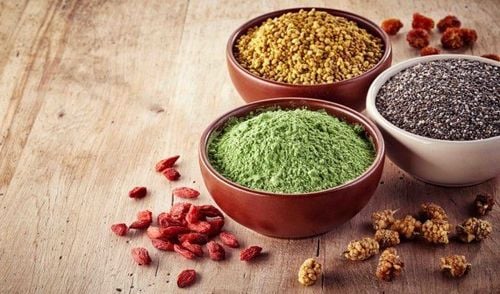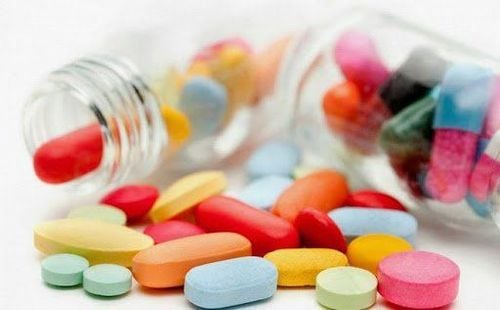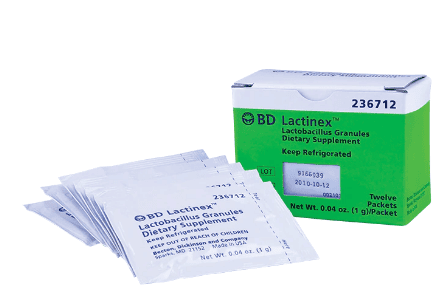This is an automatically translated article.
The digestive system plays an important role in the health of the body. But there are many people who suffer from digestive problems such as bloating, abdominal pain, diarrhea and constipation... To improve this situation, in addition to taking medicine, we can choose some foods that have The effect of improving digestion increases the digestive function in the body.
1. Digestive problems of the body
The digestive system plays an important role in your health, as it is responsible for absorbing nutrients and eliminating waste. This condition can occur in both sick and healthy people.
Some people have medical conditions such as Irritable Bowel Syndrome (IBS), Gastroesophageal Reflux Disease (GERD), Crohn's Disease, appendicitis, and heartburn, which can increase the risk of problems. severe digestion. However, even a healthy person can experience digestive issues due to a number of reasons such as lack of fiber or probiotic-rich foods in their diet. So what to eat to improve the digestive system? Here are 19 foods that are best for digestion.
2. Some foods improve the digestive system
2.1. Yogurt Yogurt is made from fermented milk and typically includes lactic acid bacteria. In addition, it contains friendly bacteria called probiotics. These are good bacteria that live in the digestive tract that can help improve digestion and keep it healthy.
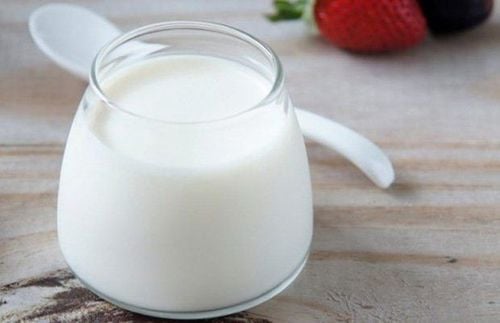
Sữa chua chứa nhiều men vi sinh tốt cho tiêu hóa
Although probiotics naturally occur in the gut, increasing your intake through foods like yogurt can be easily digested. Furthermore, Probiotics can help with digestive issues, like bloating, constipation, and diarrhea. They have also been shown to improve the digestion of lactose, or lactose, etc. However, not all yogurts contain probiotics. Therefore, when purchasing this product, be sure to read the instructions on the package label carefully.
2.2. Apples Apples are a rich source of pectin, a soluble fiber. Pectin in apples helps bypass digestion in the small intestine and is then broken down by friendly bacteria in the colon. Furthermore, apples also work to increase stool volume and are therefore often used to address constipation and diarrhea. In addition, it has also been shown to reduce the risk of intestinal infections, as well as inflammation in the colon.
2.3. Cumin is a plant with a long green bulb and stem that is used to add flavor to foods. The fiber content of dill helps to prevent constipation and improve regularity in the digestive tract.
Furthermore, cumin also contains an antispasmodic that relaxes the smooth muscles in the digestive tract. This effect of cumin can relieve negative digestive symptoms like bloating, flatulence, and cramps.
2.4. Kefir Kefir is a cultured dairy product made by adding kefir seeds to milk. These grains are the result of mixing yeast and bacteria with milk and are beneficial for digestion.
Like the probiotics in yogurt, kefir cultures, which aid in lactose digestion, will help reduce some of the negative side effects associated with lactose intolerance like bloating, cramps, and gas.
Furthermore, numerous studies have shown that kefir produces an increase in healthy gut bacteria, improved digestion, and a concomitant reduction in harmful bacteria. And Kefir consumption has also been linked to reduced inflammation in the gut, further enhancing the digestive process.
2.5. Chia seeds Chia seeds are an excellent source of dietary fiber. It works to form a gelatin-like substance in the stomach before it is consumed. Furthermore, it acts like a prebiotic, supporting the growth of healthy bacteria in the gut and thereby contributing to healthy digestion. Furthermore, their fiber content also helps promote bowel regularity and healthy stools.
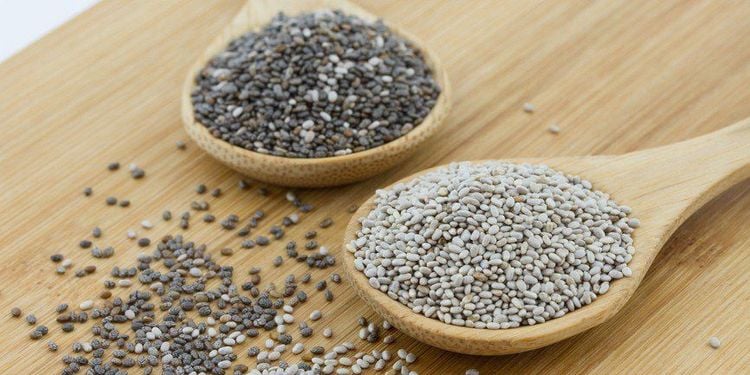
Hạt chia giàu chất xơ
2.6. Kombucha Kombucha is a fermented tea. It is made by adding specific strains of bacteria, sugar, and yeast to black or green tea, and then undergoing fermentation over a period of a week or more. A variety of probiotic bacteria are then produced during the fermentation process, which can help improve digestive health. Furthermore, several studies in rats have shown that kombucha may contribute to the healing of stomach ulcers.
2.7. Papaya Papaya is a delicious tropical fruit that contains a digestive enzyme called papain. It aids in the digestion process by helping to break down protein fibers. While not essential in the diet, it can aid in protein digestion.
Furthermore, Papain can also relieve symptoms of irritable bowel syndrome (IBS), such as constipation and bloating. And it is often used as the main enzyme in digestive supplements due to its digestibility.
2.8. Whole grains To be classified as a whole grain, it must contain 100% of the seeds including the bran, germ, and endosperm. Popular packaged whole grains include oats, quinoa, farro, and whole-wheat products.
The fiber content of these grains can help improve digestion in two ways.
First, fiber helps bulk up stools and can relieve constipation. Second, some cereal fibers act like prebiotics and help feed healthy bacteria in the gut. 2.9. Tempeh Tempeh is made from fermented soybeans. Fermentation breaks down sugar through bacteria and yeast. During this process, an antitoxin in soybeans called phytic acid is broken down. Phytic acid can interfere with the absorption of some nutrients. Hence, fermentation improves the digestion and absorption of nutrients.
Fermented foods like tempeh are a good source of probiotics. Remember that probiotics create a protective lining in the gut to protect them from harmful bacteria. Studies have found that probiotics help ease IBS symptoms, prevent diarrhea, reduce bloating, and improve regularity.
2.10. Beets Beets are a good source of dietary fiber. One cup (136 grams) of radishes contains 3.4 grams of fiber. Fiber bypasses digestion and travels to the colon, where it either feeds healthy gut bacteria or adds bulk to the stool – this improves digestion.
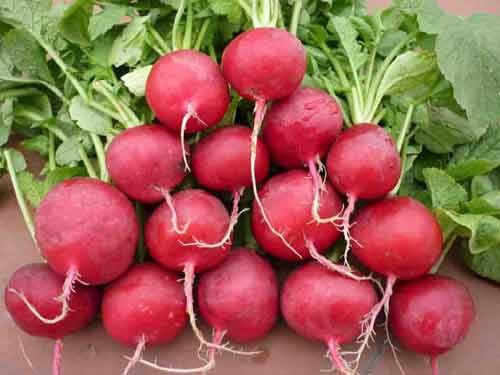
Củ cải đường tốt cho đường ruột
2.11. Miso Miso is made by fermenting soybeans with salt and koji, a fungus. Miso contains probiotics that, like other fermented foods, help improve digestion by increasing good bacteria in the gut. The probiotics in miso can also help relieve digestive problems and overcome intestinal ailments like diarrhea.
2.12. Ginger Ginger is an ingredient traditionally used in Eastern medicine to help improve digestion and prevent nausea. Many pregnant women use it to treat morning sickness.
In addition to speeding up gastric emptying, ginger when entering the body will help move food from the stomach to the small intestine faster, reducing the risk of heartburn, nausea and upset stomach .
2.13. Kimchi Kimchi is usually made from fermented cabbage, which may also include other fermented vegetables. It contains probiotics that help with digestion and promote the growth of good bacteria in the colon. The longer the kimchi fermentation, the higher the concentration of probiotics. Furthermore, kimchi also contains fiber, which can add bulk to stools and promote bowel health.
2.14. Dark green leafy vegetables Green vegetables are an excellent source of insoluble fiber. This type of fiber adds bulk to the stool, accelerating its speed through the digestive tract.
Furthermore, green vegetables are also a good source of magnesium, which can help relieve constipation by improving muscle contractions in the digestive tract. Some of the most common dark green vegetables that offer this benefit are spinach, Brussels sprouts, broccoli, and other green leafy vegetables.
Additionally, 2016 research revealed a sugar found in green leafy vegetables that helps feed good bacteria in the gut. This type of sugar is thought to aid digestion while weakening some of the bad bacteria that can cause illness.
2.15. Natto Like tempeh, natto is also made from fermented soybeans. Natto contains probiotics that act as a defense mechanism against toxins and harmful bacteria, while increasing healthy gut bacteria which improves digestion. In addition, its fiber content also improves stool regularity and relieves constipation.
2.16. Sauerkraut Sauerkraut is made from shredded cabbage that is fermented with lactic acid. Because fermentation is taking place, sauerkraut contains probiotics.
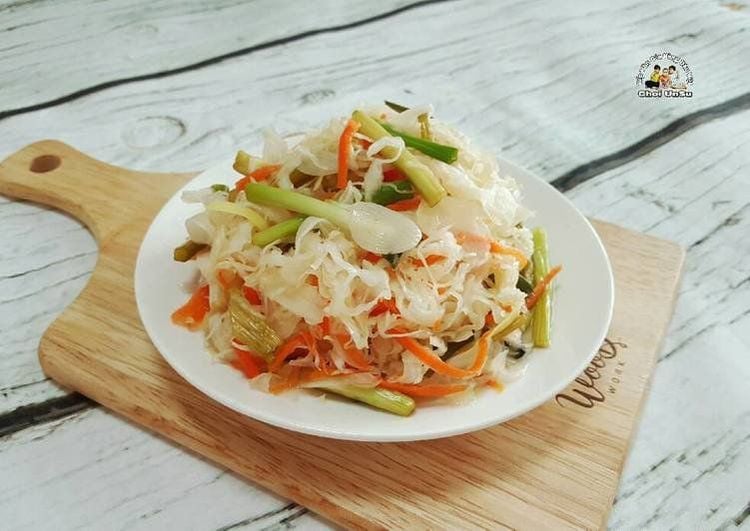
Dưa bắp cải chứa vi khuẩn tốt cho đường ruột
Research shows that a half cup (71 grams) of sauerkraut can contain up to 28 distinct strains of bacteria that help feed the gut with good bacteria. In addition, sauerkraut helps enzymes break down nutrients into smaller, easier-to-digest molecules.
2.17. Salmon Salmon is a great source of omega-3 fatty acids, which can help reduce inflammation in the body. People with inflammatory bowel disease, food intolerances, and other digestive disorders often experience inflammation in the intestines. Omega-3 fatty acids may help reduce this inflammation and thus improve digestion
2.18. Bone broth Bone broth is made by boiling the bones and connective tissues of animals. The gelatin found in bone broth is derived from the amino acids glutamic and glycine. These compounds can bind to fluids in the digestive tract and help food pass more easily.
Glutamine protects the functioning of the intestinal wall. It has also been shown to improve a digestive condition known as leaky gut, as well as other inflammatory bowel diseases.
2.19. Mint Mint grows in popularity around the world. Peppermint oil is made from the essential oils found in mint leaves and has been shown to improve digestive issues.
Furthermore, menthol can reduce symptoms of IBS, including bloating, upset stomach, and problems with bowel movements. Or it has a relaxing effect on the muscles of the digestive tract that improves digestion. It can also ease indigestion by speeding up the movement of food through the digestive system.
In a nutshell, digestive issues can be challenging, but certain foods can be helpful in alleviating uncomfortable symptoms. Adding fermented foods, such as yogurt, kimchi, and tempeh, to increase probiotics in the diet and possibly improve digestive health; Foods rich in fiber, such as whole grains, dark green vegetables, and chia seeds, also play a role in digestion by helping food move through the digestive system more easily and quickly.
Please dial HOTLINE for more information or register for an appointment HERE. Download MyVinmec app to make appointments faster and to manage your bookings easily.
Reference source: healthline.com



